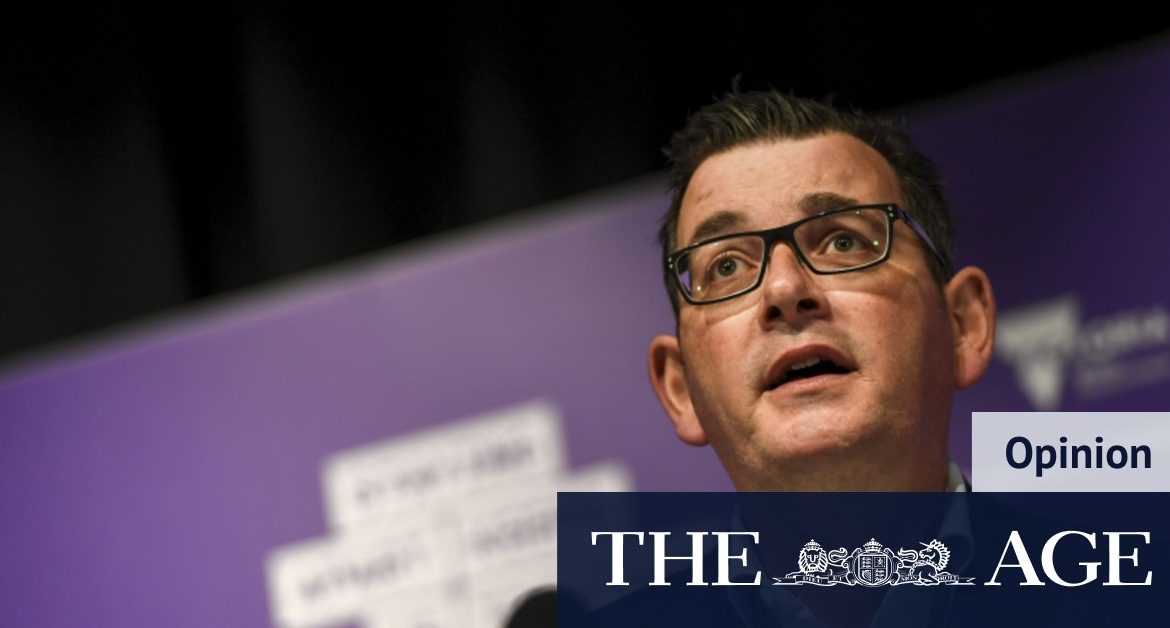It is an unsustainable model for any government to follow. Victorians know to their great cost just how unacceptable this opaque, ethically questionable model can be; it led to hundreds of deaths and serious economic damage.
Andrews is already an outlier as an election-winning Labor premier, more in the strongman mould of Liberals Henry Bolte and Jeff Kennett than in the collegial style of his Labor predecessors John Cain and Steve Bracks.
Even after the hotel quarantine fiasco there is still much community support for Dan Andrews.Credit:Justin McManus
Although it challenges the collectivist tradition of Victorian Labor, Andrews’ style has delivered for him and for the ALP. Labor’s victory at the last election was vast, reducing the Liberal Party to a confused rump. Even after the hotel quarantine fiasco, the level of community backing for Andrews remains substantial, partly driven by a sense of shared achievement in defeating the second wave.
Loading
But nothing is forever in politics; shortcomings and failings tend to catch up and overwhelm most governments. In the 65 years since Victorian politics settled into a two-sided contest between Liberal and Labor candidates to lead the state, only two premiers, Bolte and Bracks, left the post at a time of their choosing.
Three – Cain, Dick Hamer and Ted Baillieu – were forced out mid-term by their party room colleagues. Four mid-term replacements – Lindsay Thompson, Joan Kirner, John Brumby and Denis Napthine – were tipped out by the voters at the first opportunity. Kennett won two terms and then lost office at a general election. To save you counting: of the 10 premiers, eight eventually got it in the neck.

Steve Bracks was one of only a few Victorian premiers to leave office at a time of his choosing.Credit:Joe Armao
Good, long-running governments have the capacity to review their own performances and reform themselves. Good leaders know when to be reflective about their own behaviour.
Just getting through and getting past things is all well and good but it is corrosive. The government has delivered one monumental catastrophe and one stellar achievement in 2020s – paradoxically on the same issue of the second wave. It got us into it and, with the help of millions of Victorians, it got us out of it.
But there were other serious problems. This year, five ministers have left the Andrews government. Adem Somyurek was booted out of the government and the party over a branch-stacking controversy. Two other ministers, Robin Scott and Marlene Kairouz, went to the backbench in the aftermath of Somyurek’s ouster.
Gavin Jennings, once a close supporter of the Premier, walked out of politics after his relationship with Andrews collapsed. One day he was leader of the government in the upper house, the next he was gone.

Adem Somyurek was sacked after revelations of branch stacking.Credit:Eddie Jim
Last week, Jill Hennessy stepped down as attorney-general, citing family reasons. That is a big and important job for an ambitious senior MP to surrender. There’s no doubt that Hennessy is sincere in wanting to be around for her daughters as they finish their schooling but it’s also possible that she’s judged that now is a good time to step aside to see whether the government can repair itself.
The other minister to go was Jenny Mikakos, felled by the hotel quarantine disaster, which also saw off the head of her department, Kym Peake, and Andrews’ own department secretary, Chris Eccles – the head of the Victorian public service.
That is a substantial body count for a government that regards itself as being on top of things.
Loading
The apotheosis of the Premier’s approach to governing during the pandemic was the Crisis Council of Cabinet, created in early April, around the time that the hotel quarantine program was being formulated, if that is the word. It was a full-blown recalibration of responsibilities within the government, requiring its seven members, including Mikakos and Hennessy, to be sworn into their roles as super ministers. Did this greater centralisation of power work? Seemingly, it did not.
As Dan Andrews goes into the holiday season and prepares for 2021, he could well consider how his excessively confident way of leading got him through 2020. But he could also ponder whether it’s going to keep working.
Shaun Carney is a regular columnist.
Shaun Carney is a regular columnist. He is the author of books on industrial relations and the life of Peter Costello, and has been commended by the Walkley Award judges for his political columns.
Most Viewed in National
Loading







